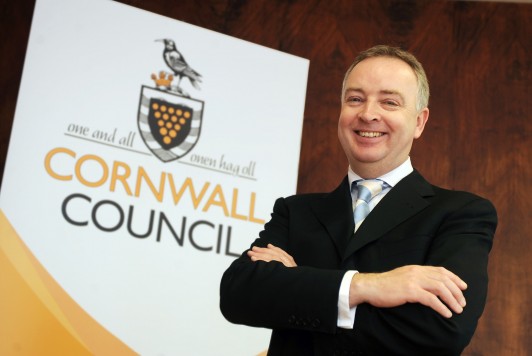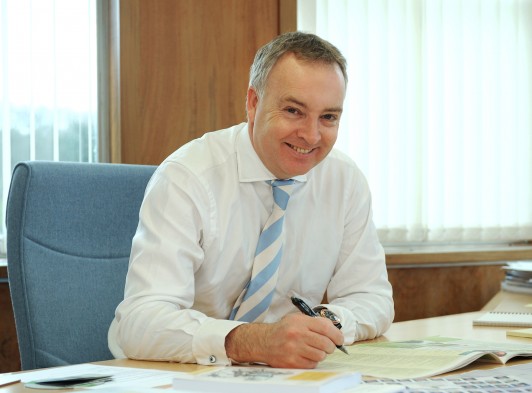As chief executive of the newly formed unitary Cornwall Council, Kevin Lavery has a huge task ahead of him. But he’s clearly not one to shirk from a challenge. The softly-spoken Geordie has ambitious plans for Cornwall, and some forthright views on the direction he feels it should take.
Having worked in a number of senior positions on both sides of the fence, he would appear to be well equipped in understanding the private sector’s needs, and the importance of public and private sectors working together in unison.
In an exclusive interview, Lavery tells us why he thinks the Council has been a back seat driver for too long, how he believes Cornwall should have more control over its destiny, his plans for the new Cornwall Development Company, and his plans to give the Duchy the fastest broadband speeds in the UK!
Business Cornwall: What do you consider yourself to be? A public sector man or a private sector man?
Kevin Lavery: A bit of both really. I have a background where I have worked in a number of senior positions in both sectors – chief exec of a local authority, assistant chief exec in Westminster, but also for large private organisations like BT and Serco at an MD and chief exec level. And I’ve also been a consultant with PriceWaterhouse.
Most of my work, however, has been either in or for the public sector.

BC: An organisation like Serco, would you call that a private sector company working in a public sector environment?
KL: The main customer base is Government organisations and when I was at BT, the same was the case. And when I was at Enterprise, most of their customers were utility companies or local authorities, so it has all been in the world of the public sector, but with the private sector as well.
BC: How do the two differ? Sometimes should the public sector be run more like a private sector business?
KL: My view is that the public sector is not a business, but it needs to be business like. I think using some of the approaches of the private sector can help, but you have to remember it isn’t a business, you are subject to the freedom of information act and so on and so forth. There does need to be transparency, but you need to be business like.
BC: Your public/private background clearly helped when applying for this job?
KL: A lot of local authorities already contract a lot with the private sector, which is certainly true in Cornwall. A key challenge for the public sector is managing those procurements and the contract management well and I think someone with my skillset brings a very helpful insight into this, because quite frankly, the public sector doesn’t do that very well.
BC: How does you role as chief exec work within the council, inasmuch as you work with elected officials, but you yourself are not elected. Who makes policy? Who reports to who?
KL: Think of a parallel with a plc, where you have a board of non-exec directors and a non exec chair. Think of that like the councillor role, they will set the direction of the organisation and the priorities. As the appointed, paid chief executive, you are effectively the manager and you’re job is to deliver. So I do report to the council, and we have 123 councillors, so it’s very big compared to any plc. That’s the theory.
BC: So it’s the councillors who set the policy?
KL: Yes, but in reality there’s more shades of grey than that rather black and white picture I’ve just painted. I’ll give advice on what I think the priorities should be and what the issues are and they can take that, leave it, or modify it. But ultimately they take the decisions on what the priorities will be, what the council tax increases will be, the financial priorities and so forth. That’s their job, that’s why they’ve been elected, to set that direction.
BC: Obviously they are a political body, do you almost have to be apolitical?
KL: Yes, and that’s important. At the end of the day they will take a view on what the priorities are and that might in part be influenced by local factors and political views, which is right and proper. They make the decision, and I try and make sure we execute it well.
BC: When you first came here how did you go about prioritising?
KL: It was difficult. When I arrived in Cornwall it felt like there were 150 things to do, but the organisation can only cope with half a dozen at a time. Because if you try and pay lip service to every single one, you will simply fail, so priority and focus is absolutely critical.
And we did set some very clear priorities. We said we would sort the organisation structure because the staff had been dangling in limbo for two years; we knew there was a problem on the budget, so we needed to fix that, while still having a moderate tax increase. We knew we had some serious performance issues in council services from the former county and the districts. And I said when I first arrived, that would take a long time to fix and it will, but we are making progress.
BC: And when you joined, unitary status was on the immediate horizon and then elections?
KL: I don’t think anyone would say that’s the perfect way to do it, but that’s the process that had been set and therefore we had to make the best of it. But in the circumstances, I think we’ve done a pretty reasonable job and we’re putting the foundations in place to create a strong council. But it’s a 5-7 year journey, it’s not going to happen overnight.
Now we have to go beyond all that internal stuff around the unitary, and say now we are one single council for Cornwall, what can we do for the broader Cornwall to help Cornwall prosper. And the prize for me here is devolution, so that the people of Cornwall have more control over their own affairs.
BC: Do you think Cornwall has enough control at the moment?
KL: No, not at all. It should have greater influence…
BC: Who controls Cornwall? Is it Whitehall? The RDA?
KL: If you look at the total spend in public services in Cornwall, you’ll probably find the Council is about a quarter of the total value. There’s a lot of money spent on health, JobCentre Plus, the Ministry of Defence, the development agency and so on and so forth. I’m not saying the Council should have control of all of that, but it should have much more control than it does.
BC: Do you have a view on a Cornish Assembly?
KL: I think that is probably political at the end of the day, but what I would say is that if we can create a strong unitary with a much greater influence over other public services like health and the economy, you are making significant steps toward that.

BC: One of these building blocks you’re putting in place is the Cornwall Development Company. Is this just Cornwall Enterprise under a different name?
KL: I’m not going to speak for the past. For me it’s about looking to the future. We spend a lot on the economy in Cornwall, far more than other areas. We’ve had the benefit of a major European programmes, in the Objective One and now Convergence. Some things have worked really well, like the Combined Universities for Cornwall, but I don’t think we have been as nearly as effective as we could be on the economy, and what we need is an organisation focusing on things like the CUC programme, the big transformational changes, because Cornwall remains one of the poorest areas in the UK.
Frankly a lot of little projects is not going to change that. We need to focus of five or six transformational changes which are to do with the structure of the economy – the cultural sector, higher education, the green industries, the jobs of tomorrow. But also looking at our core strengths like agriculture, food processing and tourism. There is high value employment in those areas and they are in fact increasingly important in a world where globalisation might be moving in reverse. I think the traditional sectors are still very important for the future of Cornwall, but it doesn’t mean you just do what you did in the past.
We’ve got to look at our existing industries and look to see how we can modernise them to remain competitive and meet the challenges of tomorrow.
BC: Are all the faces in place now at CDC?
KL: We’ve appointed the board, Martin Brooks as chairman, we’ve appointed Martin Bell for tourism, and we’re just about to announce the appointment of the chief exec. I’m very pleased with the appointments, but I do realise this has been in limbo even longer than unitary, and we have to play catch up here.
What I want to see is the CDC being a very focused, delivery-based organisation concentrating on half a dozen transformational programmes that affect the long-term economy of Cornwall.
And by the time this article comes out, we will have formally announced that we’re going for the region of culture for Europe, we’re going to compete for the UK city for culture as well. It’s all about showcasing the best of Cornwall and bringing the best of the world to Cornwall. And it’s not just about culture, but it’s about the economy and about jobs.
BC: Is it still a priority to attract inward investment into Cornwall. I’m thinking Cornwall Pure Business’ role under Cornwall Enterprise.
KL: I think we have to have a much stronger focus on the indigenous businesses and strengths of the area to be honest, although we shouldn’t close our eyes to inward migration, as we do get 5,000 net inward migration coming to Cornwall every year, and the vast majority are of working age.
So if you’re coming to Cornwall and want to operate your business here, you can do it really well. One of the big things that will be done is high speed super broadband.
BC: I have an issue with that myself. It’s not as fast as it should be is it?
KL: We’re in the procurement process now, so by the end of the year we will announce a preferred bidder to develop a super-fast broadband network in Cornwall that will be the best in the UK. I think that gives us a really competitive advantage. We’re talking about for larger companies, a gigabyte of speed which is incredibly fast, which will put Cornwall in a great place to do internet business anywhere in the world.
BC: Going back to who controls Cornwall, does the Council have enough say?
KL: I think part of the issue is confidence. If you look at Cornwall’s history as I do being an outsider, Cornwall was an incredibly confident, entrepreneurial place in its industrial heyday. But it has lost some of that confidence, and I think we have, as an area, got to be confident again in our own destiny, because there is a very bright future.
If you look at the RDA, they manage the Convergence programme, but it’s Cornwall’s programme. It’s their job to administer that, but at the end of the day Cornwall has to set the priorities.
BC: Are they the right people to administer it?
KL: I know there’s been political debate whether we should have regional organisations. What we need to ensure, whatever the arrangements for administering the programme, is that the priorities reflect those of the people of Cornwall and not those outside of Cornwall. The council needs to take leadership in doing that, and we will do that.
BC: So there clearly needs to be a very close working relationship?
KL: Yes, and if a new administration comes in and decides they don’t want the RDAs, our job up until that point is to work really effectively with the RDA and if that changes, if we get those responsibilities, or someone else does, we have to make sure it works well. The key thing is that it’s Cornwall’s programme irrespective of who administers the programme. And I don’t think the Council has been bullish enough on that. It hasn’t had enough of a strong leadership and has been a bit of a back seat driver to be honest. I think we should be in the front seat, with the wheel in our hands.
BC: When the RDA recently had to cut back on its budgets, did they consult with you?
KL: To be fair I felt for them, because the scale of the cuts was huge, and it’s very damaging for the whole of the south west when that happens. We were very fortunate in Cornwall that the matched funding for the Convergence programme was protected, however there were a number of projects in Cornwall and elsewhere that were cut which is regrettable, but I do understand they had to make some very hard decisions.
BC: Did they consult on these projects with you at all, for example the work on Falmouth Docks?
KL: That is something I strongly support, but it was never formally in the programme, so that wasn’t cut, it was just something being discussed. But there were programmes in Camborne Pool Redruth, for example, which had been cut, and I think that’s regrettable. And I do fear for the future. The Convergence match funds could be at risk in the future, for while the private sector may be coming towards the end of the recession now, as some commentators are suggesting, the public sector is about to go into recession. We are going to be faced with the mother of all spending squeezes.
BC: People say in times of recession, the public sector is the place to be.
KL: There is a lag effect. Tax revenues have declined tremendously and therefore the amount of Government spending will have to go down to match this. So all the senior managers in local government know that, particularly after the General Election, we are going to be faced with a spending squeeze like never before. And that will be a huge challenge for Cornwall, because if you look at the Cornish economy, the Government sector is a huge part, a much bigger part of the Cornish economy than it is in most other regions.
So if we have the Council and other public agents trimming every year from 2011 onwards in a significant way, that in itself is going to be a big challenge. And this is one of the advantages of being a unitary. I know a lot of people didn’t think unitary was a good idea, but one of the great opportunities we have is because we do have duplication and inefficiency from the previous districts, if we really push that and focus on removing the duplication and improving the efficiency, in a spending squeeze, fingers crossed we can protect front line services.
BC: What’s your long-term plan personally?
KL: What we need here is stability, continuity and focus. And a team, at political and officer level, that is like a dog after a bone. We’ve had too much change in recent years. And I’ve said to the Council, it will take 5-7 years to turn this around into a really top, top council that’s going places. It’s that sort of project and I want to be part of that for the whole period.









